12 Unhealthiest Store-Bought Marinades You Can Buy
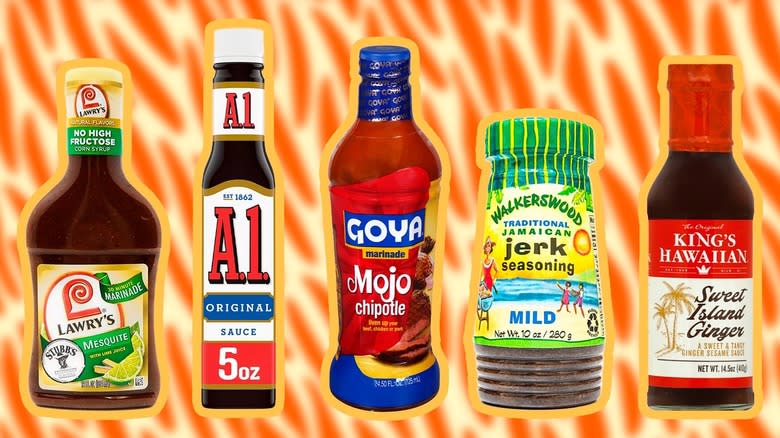
Whether arranging a backyard barbecue or meal prepping for the week, marinades can drastically transform your dishes. You might know them as a popular way to flavor and tenderize meat, but they can also boost your veggies, fish, and salads. While you should carefully control the quantity and time it spends in contact with your food, the perfect marinade can take your cooking to the next level.
When you're ready to experiment, the grocery store selection will probably overwhelm you. Presented with so many colorful bottles, your first instinct is to grab the most prevalent or familiar brand –– but this choice could end up risking your health. Watching our wellness feels more challenging than ever with hidden ingredients and poor nutrition scores plaguing our everyday foods.
Coating your chicken in a tasty marinade might feel like a forgettable afterthought, but it could reap sneaky consequences. Many marinades in the grocery stores deliver outrageous sodium and sugar counts, not to mention artificial additives or preservatives. Even more duplicitous are the shockingly minuscule serving sizes. So, before you dive into the world of marinades, do right by your body. We're here to break down some of the worst marinades on the market for your health's sake.
Read more: 16 Little-Known Facts About Salt
12. Litehouse Italian Dressing & Marinade
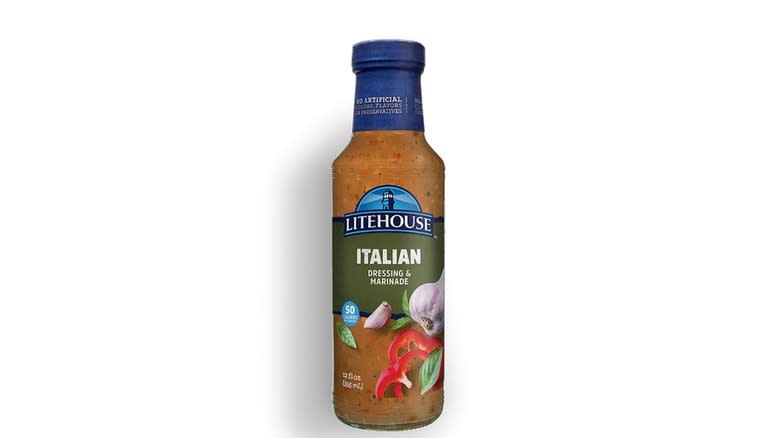
An Italian marinade is an excellent option for giving your meat or veggies a bright, fresh finish without weighing them down or burying their flavors. Litehouse's take on the classic is a versatile dressing and marinade that feels perfect for everything from coating chicken to topping salads or pasta. The ingredients list is refreshingly short, including canola oil, brown sugar, and vinegar. It also packs spices like dried garlic, onion, and red pepper.
So, what's the problem? Although the Litehouse brand conjures images of healthier options, this Italian marinade isn't as "light" as you'd expect. The brand doesn't add any artificial flavors or preservatives, but a serving size of two tablespoons already delivers 340 milligrams of sodium. Considering the daily recommended sodium intake is 2,300 milligrams, this simple addition to your meals quickly adds up, especially when we usually use a marinade much more liberally than the serving size.
Litehouse's marinade also packs 50 calories and 4.5 grams of fat per serving thanks to its oil base. An oil's nutrient-dense fats can be heart-healthy and an essential part of our diets in moderation. However, though a zesty Italian dressing typically begins with an olive oil base, Litehouse opted for a substitute of cheaper and potentially less healthy canola oil. Medical News Today reported that canola oil has been linked to adverse effects with inflammation and memory, meaning we'd much rather play it safe and see an antioxidant-rich olive oil.
11. Walkerswood Traditional Jamaican Jerk Seasoning
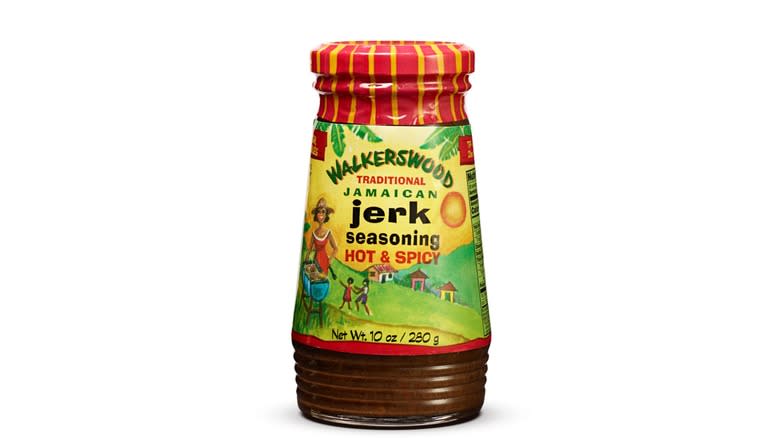
Jerk is a popular style of barbecuing across the Caribbean, involving meats marinated in a celebration of spices known as Jamaican jerk. A typical jerk recipe calls for several ingredients you may not be used to buying at the grocery store, so Walkerswood made it easy and delivered a traditional Jamaican jerk in a jar. The marinade's list of ingredients is short but simple, and it's happily free of any preservatives. Some of its traditional additions include Scotch bonnet peppers and allspice, blended with scallions, nutmeg, thyme, and salt –– lots of salt.
We could forgive the fact that the marinade is missing some traditional Jamaican jerk ingredients, like cinnamon, ginger, or rum, but its nutritional score is irredeemable. The jar lists five calories, two carbs, and zero fat per two-tablespoon serving, but fat-free can be a forewarning of danger in the form of extra sugar and salt. 540 milligrams of sodium tower above the other counts on the label, suggesting Walkerswood thought it could replace a few spices with more salt.
One disgruntled TikToker reviewed the seasoning with a few choice words, describing its flavor as, "salt, salt, salt ... followed by the spice." Unsurprisingly, a serving suggestion on the label advises users to apply the sauce "sparingly." Sodium-heavy diets can increase blood pressure and put us at a greater risk for heart attacks or strokes, meaning it's best to discard the salty marinade for something gentler on our cardiovascular system.
10. Goya Mojo Criollo Marinade
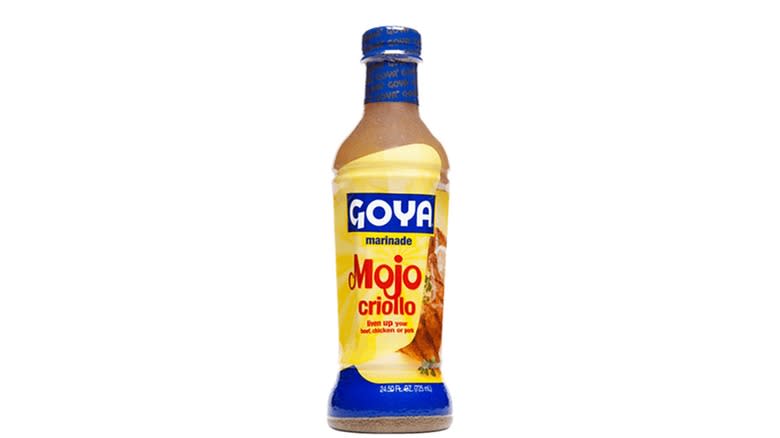
Goya Foods has long been one of our go-to brands for Mexican-style ingredients. Its line of marinades adds a satisfying zing to your beef, chicken, or pork, accompanied by a hearty side of rice and black beans. The Mojo Criollo is Goya's offering for Cuban-inspired dishes, listing a blend of orange and lemon juice concentrates balanced by garlic, onion, and spices –– a mouthwatering, lip-puckering delight. So, do you want the good news or the bad news first?
In its favor, a serving size of two tablespoons carries only 10 calories, one gram of sugar, and zero grams of fat, meaning the tallies won't skyrocket even with a generous coating. What will get out of hand is the 540 milligrams of sodium per serving that transform the tasty sauce into a salt bomb. At almost a fourth of the recommended daily amount, we don't think it's worth risking our blood pressure.
Even more troubling are two ingredients listed in the small print: sodium benzoate and potassium sorbate, a tandem of common preservatives that extend the shelf life of several foods and household products. When mixed with ascorbic acid (like vitamin C in lemon juice), sodium benzoate can convert into benzene, a possible carcinogen (via Healthline). Don't panic –– he scarce levels of sodium benzoate in our foods are unlikely to be harmful, but to avoid risk, we'd prefer a marinade with fresh, simple ingredients that are free of preservatives.
9. A1 Chicago Steakhouse Marinade
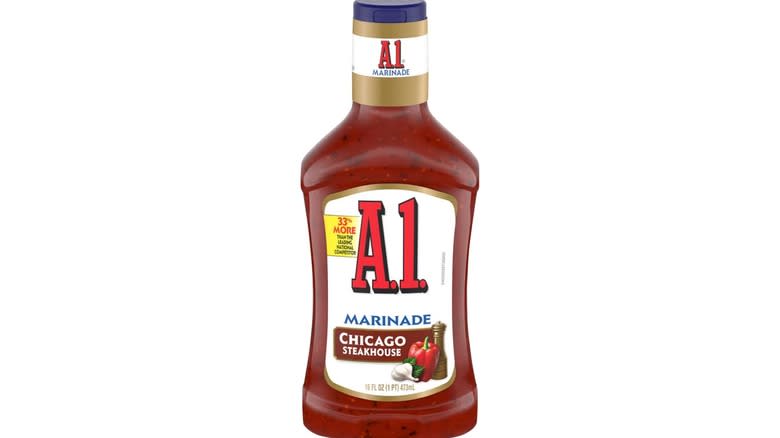
We know what you're thinking: "Leave A.1. alone!" The beloved steak sauce is a classic, adding an irresistible, tangy twist to beef. Compare it to whipping up a homemade steak marinade, though, and you'll see it's a far cry healthwise. The steakhouse marinade starts with a saucy tomato base and blends in red bell peppers, garlic, and a bit of paprika -- all good up to this point, right? Scan the nutrition facts and you might reconsider.
The first red flag is the serving size, which is only one tablespoon. Surely everyone uses more than a tablespoon when they open that bottle –– even A.1. suggests a recipe on the sauce's product page that uses ½ cup of marinade for two steaks. And while a single serving may have only 10 calories and one gram of fat, the sodium content skyrockets to 250 milligrams. So, if you followed the recipe, each steak would crush you with 1000 milligrams of sodium, akin to eating eight ounces of potato chips.
Each serving also contains two grams of sugar, which may not sound alarming, but consider that these added sugars come from high fructose corn syrup. While plenty of suspicion surrounds the common additive, the FDA reassures us that it's no different from other sweeteners. The key to healthy consumption is moderation –– a definite challenge with marinades that are far too easy to overdo.
8. Lawry's Herb & Garlic
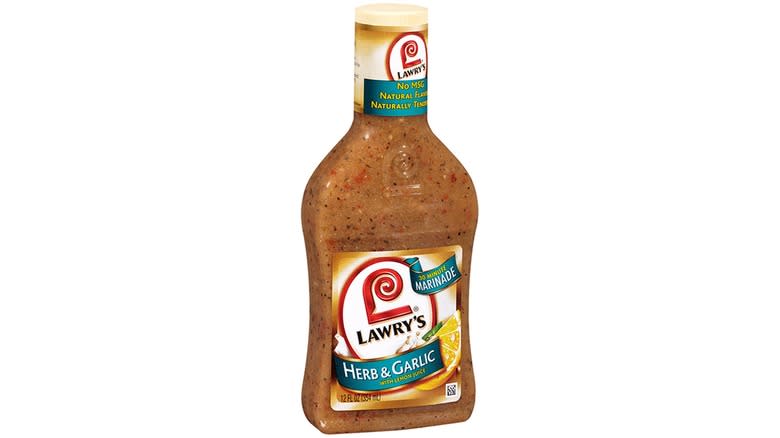
Lawry's is a kitchen staple in many households, perhaps so familiar we've never bothered to check the nutrition facts. The brand's herb and garlic marinade is a spin on a traditional Italian dressing, suitable for marinating chicken but flexible enough to toss into a potato salad. Bright and robust, the marinade's base is vinegar and lemon juice, featuring spices like red bell pepper and garlic with herbs like basil and thyme. Even if the brand represents is a favorite, knowing what's lurking beneath the surface might have you putting it back on the shelf.
The marinade has only 10 calories, two grams of carbohydrates, and zero fat. What's troublesome is the 330 milligrams of sodium, especially considering they're packed into a serving size of just one tablespoon. Even the brand knows it's fooling no one: a chicken cordon bleu recipe on the website calls for ½ cup of the marinade for four small chicken breasts, amounting to two tablespoons per piece. Remember, these serving sizes regard 2,300 milligrams of sodium as the recommended daily amount, but the American Heart Association proposes diminishing that figure to 2,000 milligrams to improve blood pressure and heart health.
The marinade is also riddled with additives, from thickeners like corn starch and xantham gum to preservatives like potassium sorbate and sodium benzoate. Is it so much to ask for a tasty chicken marinade that won't have us counting sodium levels or questioning the ingredients?
7. King's Hawaiian Sweet Island Ginger
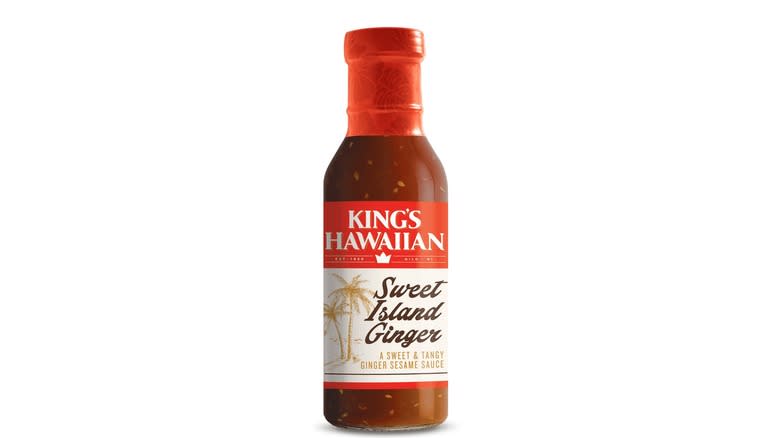
King's Hawaiian evokes memories of backyard barbecues eating pulled pork on soft white buns. The brand is renowned for its sweet rolls but also offers a lineup of marinades like Sweet Island Ginger. Technically a BBQ sauce, the marinade is an instant crowd-pleaser presenting ingredients like thick tomato paste, molasses, ginger, pineapple, and tamarind. This sweet and tangy combo sounds tropical, but the sunny illusions dissipate when you compare your wellness checklist with its nutrition breakdown.
The marinade is fat-free, but 50 calories in a two-tablespoon serving will accumulate quickly if you like your barbecues saucy. Add the accompanying meat, bread, and side dishes and your meal can become quite caloric. Although the sauce's 340 milligrams of sodium is high, the most tricky aspect is the 11 grams of added sugars –– more than the amount in three Chips Ahoy cookies. The NHS advises that the average adult should stick to around 30 grams of added sugars daily and that excess can cause cavities or complicate maintaining a healthy weight. Unnecessary added sugars invade many of our everyday cereals, sauces, and drinks –– even those we don't expect. An easy way to watch your sugar consumption is by swapping out the marinades designed to bombard your sweet tooth.
6. Lawry's Mesquite With Lime
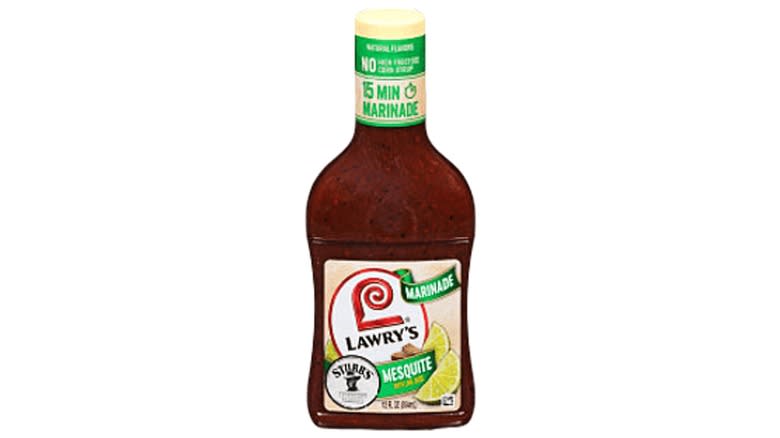
Go to any barbecue joint and you'll probably notice "mesquite-smoked" on the menu, nodding to the popular practice of grilling meats with wood from the shrub-like mesquite tree. Lawry's capitalized on the trend and squeezed the taste into its Mesquite with Lime marinade –– brimming with bold, smoky flavor and a splash of acidity. The sauce sounds like just the complement you need to upgrade your at-home barbecues, but one glance at its ingredients might have you leaving it to the professionals.
Grinding and using the mesquite tree's pods to marinate meat is one method of capturing its smoky flavor, but we're not sure how Lawry's does it –– the bottle vaguely lists, "Natural Flavor (including Mesquite Smoke)." Other ingredients include lime juice, chili pepper, oregano, and plenty of salt, amounting to a marinade low in fats and calories but packing 330 milligrams of sodium per tablespoon. Another questionable element farther down the list is caramel coloring, an additive that makes the marinade brown purely for grocery store aesthetics. A 2007 study by the National Toxicology Program revealed that the coloring can be cancer-inducing in mice, although a 2017 study published in Food and Chemical Toxicology assures it poses no risk in tiny, regulated amounts. Considering Lawry's sauce also includes other additives and preservatives, we're reminded of one of the greatest mistakes with marinades: too many ingredients.
5. Sweet Baby Ray's Original Barbecue Sauce
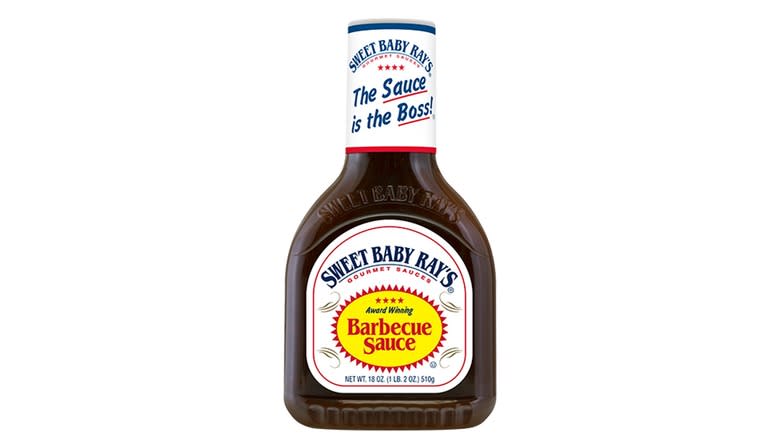
Who says you can't use barbecue as a marinade? The thick, sweet, and smoky sauce pairs beautifully with tender ribs or chicken wings, but you might want to skip Sweet Baby Ray's for wellness' sake. While it looks and tastes like a classic barbecue sauce, its list of ingredients is a bit too close to a serving of jellybeans. At the top of the marinade's list is high fructose corn syrup, spiraling into preservatives like sodium benzoate and additives like caramel coloring. Buried in the small print are a few traditional barbecue ingredients, like tomato paste and pineapple juice, with a touch of garlic and tamarind.
Sweet Baby Ray's nutrition facts reflect its lack of quality ingredients, delivering no fat or cholesterol, but piling on 16 grams of added sugars and a consequent 70 calories every two tablespoons. According to the American Heart Association, one serving of this marinade is almost half of your daily recommended sugar intake. Opposed to more complex sugars in fruits, these simple added sugars are processed by the body almost immediately, taking you for a sugar rush and potentially burdening your system with unnecessary calories. Cutting out these syrupy marinades is one easy way to watch your sugar intake and look after your health.
4. Great Value Lemon Pepper Marinade
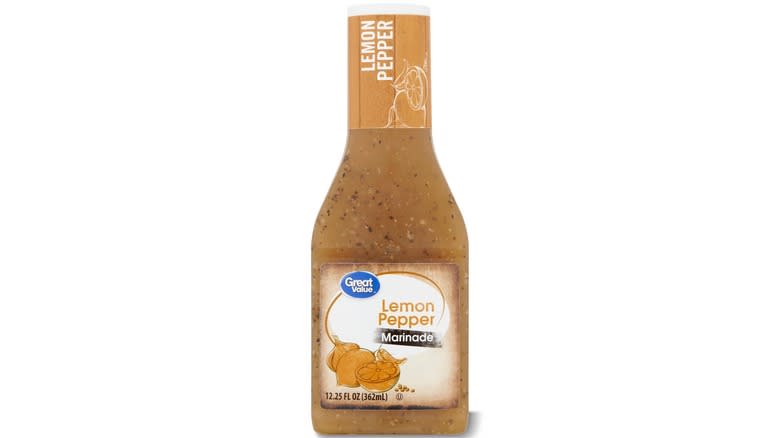
Great Value is Walmart's familiar proprietary brand, offering hundreds of cheaper alternatives to trademark favorites, though not without some landing on the list of unhealthiest Great Value foods. Its Lemon Pepper marinade sounds like a tasty chicken rub or salad dressing, but what you save in cost and convenience is not worth what you pay in wellness. A meager one-tablespoon serving contains no fat and only 10 calories, but packs 330 milligrams of sodium –– almost a sixth of the recommended daily amount.
The marinade's ingredients also aren't doing its flavor, or your health, any favors. A comparison from Tasting Table ranked it as the worst of 14 marinades, likening its advertised lemon flavor to ammonia. Apart from the expected ingredients like lemon juice, black pepper, and garlic, the sauce is loaded with unnecessary additives and high fructose corn syrup –– the highly processed sweetener that has snuck into many everyday foods. Diets heavy in high fructose corn syrup can contribute to several disorders, from diabetes to liver disease.
Another culprit on the bottle's label is calcium disodium EDTA, a common preservative found in many food and cosmetic products but is poorly absorbed by our bodies, potentially provoking digestive issues if consumed in excess (via Healthline). However, there isn't enough to cause much alarm in Great Value's Lemon Pepper unless you're consuming it in mass quantities.
3. Trader Joe's San Soyaki
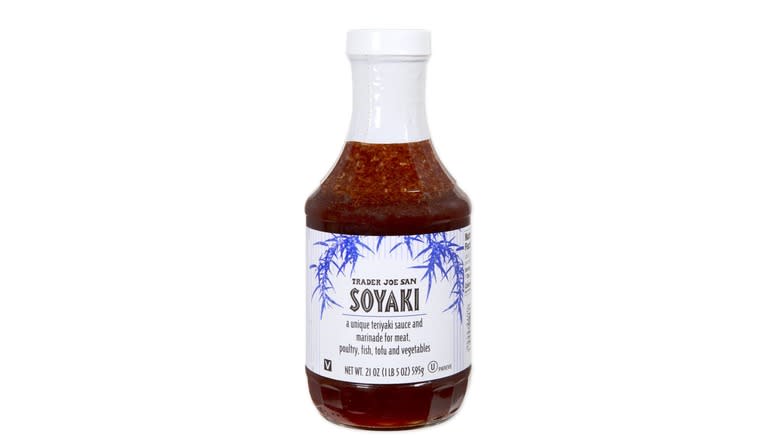
Trader Joe's is the beloved supermarket chain known for its extensive private label lineup of affordable and sustainably-driven products. San Soyaki is the brand's unique twist on teriyaki –– an umami-based blend we can imagine using to marinate salmon or sauté vegetables. Still, San Soyaki is no exception to an unfortunate teriyaki trend, as the Asian-inspired sauce is notoriously high in sodium and sugar.
In its favor, Trader Joe's marinade is free of preservatives and has a short and flavorful list of ingredients, including soy sauce, garlic puree, and dried ginger. What it boasts in flavor it lacks in nutrition, tipping the scales towards downright unhealthy. Each serving delivers five grams of added sugars and a whopping 490 milligrams of sodium –– all in one tablespoon. This hyper-palatable layering of sweet and salty ignites our taste buds and reward systems, making it difficult to stop at just one tablespoon and potentially skyrocketing our sodium and sugar consumption and possibly increasing your chances of developing cardiovascular issues or diabetes. You're better off finding a marinade that goes easy on taste enhancers and your wellness.
2. Soy Vay Veri Veri Teriyaki Marinade & Sauce
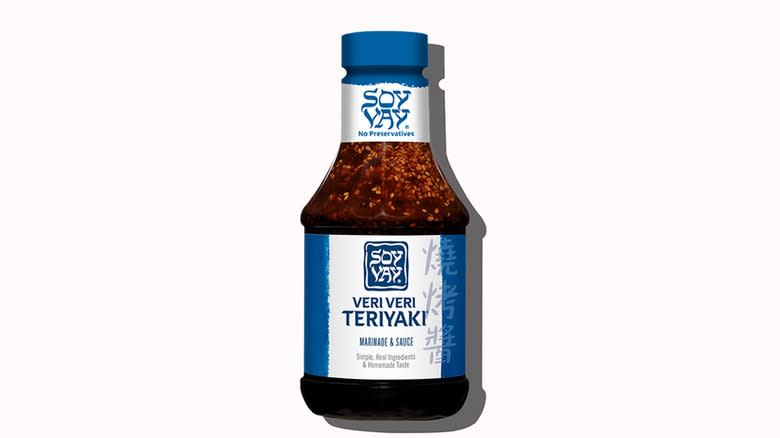
Before it was the household sauce we know today, teriyaki originally referred to a Japanese cooking method implemented to preserve and flavor fish. A powerful concoction of sweet, salty, spicy, and umami, teriyaki works wonders for marinating chicken, seafood, and even hamburgers. We now have tons of variations of the rich seasoning, including Soy Vay's Veri Veri Teriyaki –– which also happens to be very, very salty. A single tablespoon inflicts 580 milligrams of sodium, crushing a fourth of your daily recommended intake.
Like most teriyaki sauces, Soy Vay's marinade is soy sauce-based, followed by a straightforward list of other ingredients like sugar, onion, and garlic. The label includes more salt further down the list, begging the question, "Was the additional sodium really necessary?" Wet think you shouldn't have to risk dehydration for good flavor.
The marinade wins back some wellness points for its lack of preservatives and low cholesterol and fat, but the sodium-laden sauce packs 40 calories and seven grams of added sugars per serving, cementing it on the unhealthy side. Although you should always use salty marinades sparingly, finding a delicious teriyaki sauce doesn't need to potentially compromise your health, so consider making your own teriyaki sauce and adjusting the ingredients accordingly.
1. Allegro Tennessee Whiskey Marinade
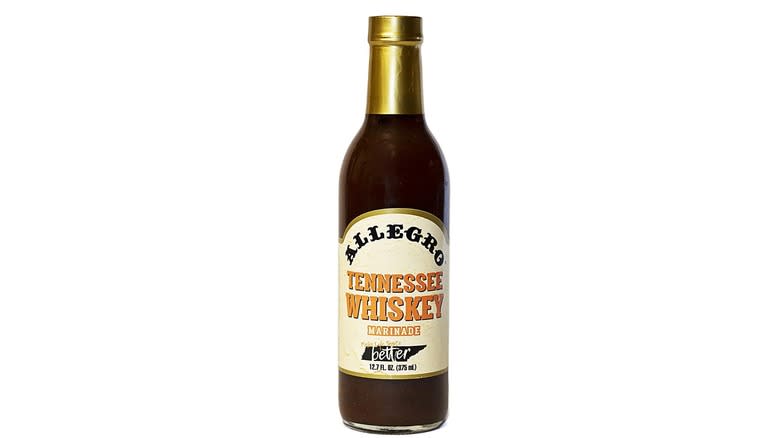
Allegro's Tennessee Whiskey marinade sounds like just the saucy and slightly boozy seasoning your barbecues need. The flavor profile promises smoky, savory, and tangy, but its ingredients and nutrition facts are a double whammy to your health. Brown sugar is the first ingredient, followed by mustard, Worcestershire sauce, bourbon whiskey, and several spices. These components could create an excellent marinade, but additives like caramel coloring and preservatives like sodium benzoate tarnish them. Why opt for a marinade loaded with artificial enhancers when you can buy preservative-free or make your own at home?
The nutrition facts reflect the troublesome ingredients, delivering six grams of added sugars and 470 milligrams of sodium in a serving size of only one tablespoon. While the marinade is fat and cholesterol-free, do the math and you'll realize each tablespoon is about 70% salt and sugar. Its 30 calories per serving –– most of which come from sugar –– also accumulate quickly, especially if you follow the product page's recipe for baby back ribs, calling for one entire bottle. It doesn't take a mathematician to figure out that nutrition breakdown would be eye-opening.
How We Chose Our Marinades
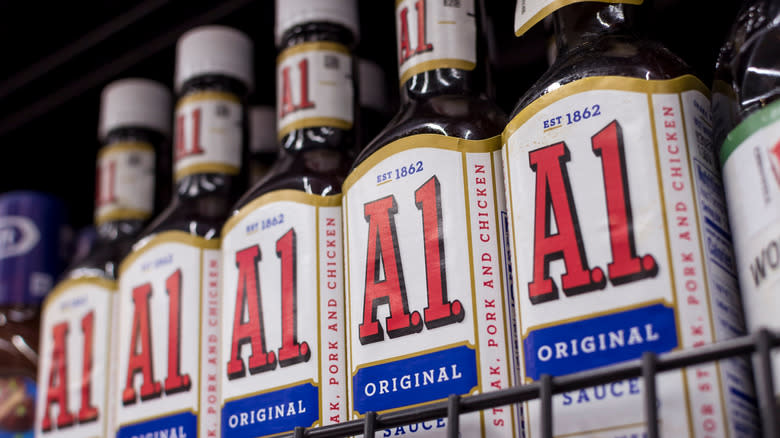
Our selection started by examining popular store and name-brand marinades alongside lesser-known companies, including some that are occasionally advertised as healthy alternatives. From there, we narrowed it to common marinade types for practical consumer consideration.
With a selection of sauces in hand, we compared the ingredients on their labels, studying which ones listed salt or sugar high on the list and which included potentially not-so-healthy additives or preservatives. We also kept the recommended serving sizes in mind and compared them to what would be more common usage, noting where the two didn't match up. We finally considered the nutrition facts, including fat and cholesterol but watching out specifically for high sodium, sugar, or calories.
Read the original article on Mashed

